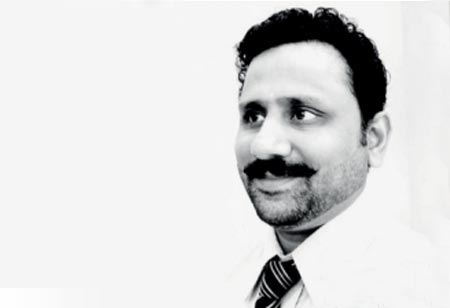PMP Knowledge Areas: "Wheels Of Business's Chariot"
By Shailesh Thanekar, Project Manager, Rolta India Limited.

Shailesh Thanekar, Project Manager, Rolta India Limited.
Thanekar has a demonstrated history of working in the information technology and services industry
‘The organizations that do not recognize the importance of best management practices and tools are experiencing the downfall of the business.’ The organizations that value and adopt the lean principles are bound to progress over time and shall create good value for the business.
The organizations that have adopted the need of regular upgrades of both technical and soft skill of the members involved.
The study indicates many companies are increasing their budget for learning and development. Many of them take help of technologies like mobile learning solutions and conducting social learning activities. Yet, No of companies term themselves have culture as “Controlling” with little collaboration.
Although Organizations are adopting new practices they are still going through various critical pressures, mainly not having enough supply of “LEADERS” in the era of agile product/services delivery.
Finding or developing such talent has now days become strategic business priority. Still, many of the organizations are struggling to build the process of empowering the employees with tools and processes they may need to create expected results.
Emergence of a new generation and the rise of the independent worker, companies must rethink their approach to talent and begin to prioritize the “Individual.” The main challenge most of the organization facing or rather failed to make their employees adopt the change or new trends.
Alongside technical skills development programs, the organizations must focus a new mechanism for learning that can adapt to the needs of a changing workforce and align closely with organizational objectives.
Latest Training verticals makes Learning as the most mature areas of talent management & much more innovative, with recent technology advancements and the rapid adoption of social collaboration. Organizations must recognize value for such program and invest in learning management program and management solutions.
Encouraging the adaptation of changes and new technological changes is the key, readiness for transformation for adopting trends of Mobile technologies, social networking are to be closely aligned with business objectives. Encouraging continuous employee engagement, and employee satisfaction over more concrete business metrics.
Today, soft skills are no longer optional. Organizations must adopt the vertical development of managers to make them better at leading multicultural teams, solving problems effectively and creatively, and adopting an agile approach. Organization must change their learning strategies to meet the demands of today’s workforce. “PMP training verticals” is one of those key solutions to enhance the management leadership in agile era of doing business. Such training program helps people to take their thinking up to next level of performance, helps them identify and solve problems and most importantly to accept that there are some problems that they can’t solve. This also strengthens an individual’s ability to put their technical skills into practice effectively and empowers them to apply their expertise in new and changing environments.
“PMP framework provides great solution to keep all the stakeholders aware and encourage adopting integrated changes in the process and advancement in technology as well”
Any business running is no less than pulling “Jagannath's Chariot” as all the wheels of Business chariots are needs to be properly aligned and maintained continuously. PMP Training provides basic framework of the alignment and maintenance of Knowledge Areas (wheels) of the Chariot.
Understanding Management of such wheels is key for the success of any organization. Adopting “Deming cycle-PDCA” (plan–do–check–act is an iterative four-step management method used in business for the control and continuous improvement of processes and products.
The Knowledge area in Project management Framework are those wheels of the chariot, if managed well, will be the key for success and growth of the organization. All the employees must be informed and in depth knowledge of this wheels shall be provided to all the leaders in business process to maintain effective running of wheels like
• Integration: Management of plans, control the outcome and close.
• Scope: Management of definitive scope and finalize the product/ Services.
• Time: management of needed activities to be performed sequentially in the time frame that suits business objectives.
• Cost: Manage the cost efficiently as per budget planning.
• Quality: Maintain the required quality of product and service and look forward for continues improvement.
• Human: Management of effective use of Human resources in collaborative manner.
• Communications: Management of clear and collaborative communication for smooth running of business processes.
• Risk: Management of risk efficiently to overcome possible threats to business objects and mitigate with minimum effect.
• Procurement: Managing the procurements internally and externally integrating the requirements.
• Stakeholder: Managing the all the stake holders of the business process effectively to achieve the business objectives.
Thus PMP framework provides great solution to keep all the stakeholders aware and encourage adopting integrated changes in the process and advancement in technology as well. This Vertical development relates with how we interact with different levels of processes and authorities. The framework suits and also allows constantly evolving working environments by challenging old assumptions and testing new hypotheses.
By aligning Project Management training strategies with corporate objectives and leveraging innovative technology, organizations will be able to significantly improve their results. Earlier, organizations had limited technology choices for training and development, but today there are various solutions emerging .Organizations should consider professional providers with innovative capabilities and also understand the importance of measuring the effectiveness of Training activities.
Organization must shift the way they assess employees and also consider focusing on the individual and his or her unique learning requirements. They also need to be careful as many such programs take for granted that if you teach people how to manage, they will do it on their own. However, the most difficult challenges that people face in their work lives are often associated with limiting the way they ‘Create Meaning’ at their current level of development.




